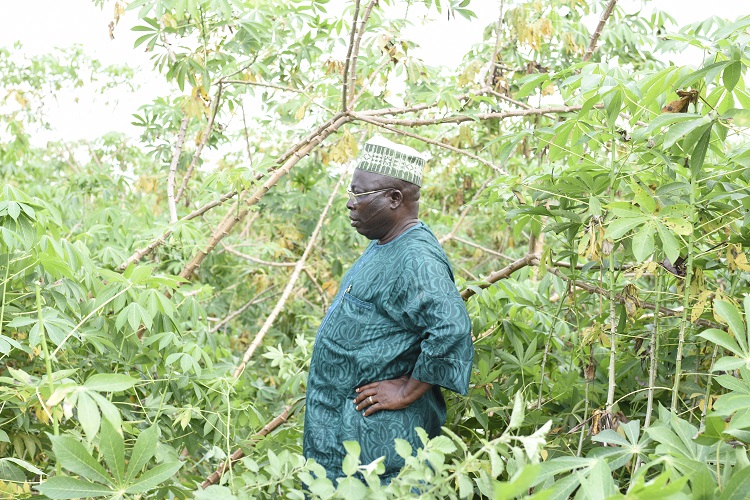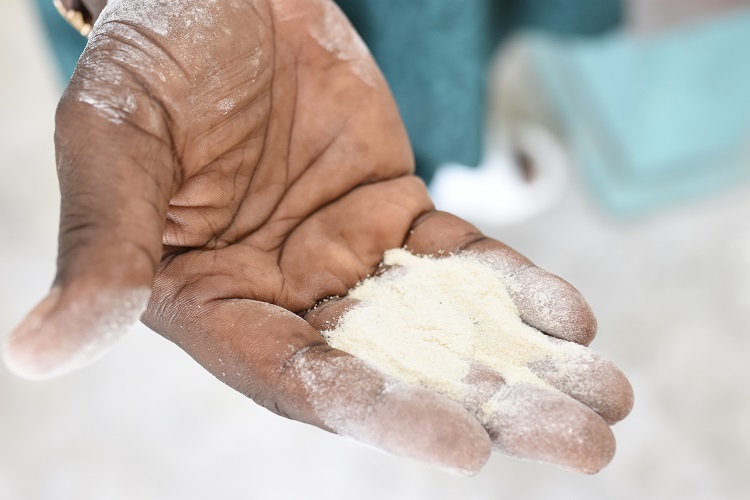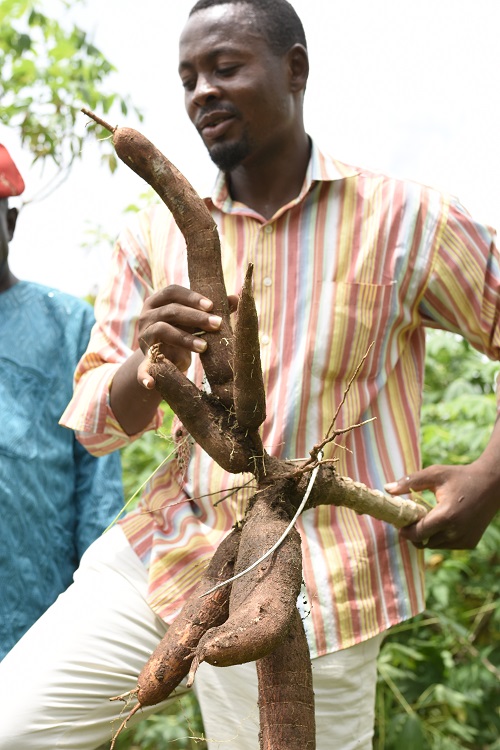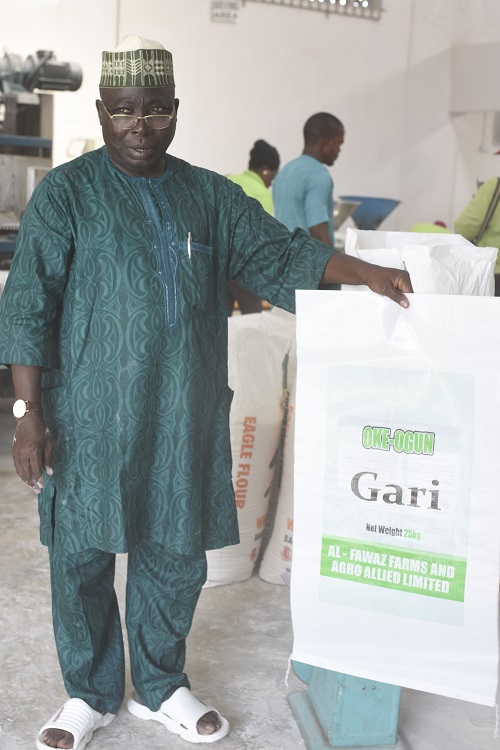
For many of us, seeing is believing. When it comes to cultivating cassava, the CAVA2 project team has solid evidence that their training in good agronomic practices is helping farmers to increase yield by more than 25%. By using demonstration plots, farmers can see with their own eyes the effect that CAVA training has on yield and quality.
 “You know, before we planted in a scattered way, we didn’t even mind the spacing that we were losing,” recalls Mr. Tunji Babalola, Managing Director of ‘Al-Fawaz Farms and Agro Allied Ltd’, an SME located in Iseyin, Oyo State, 200km north of Lagos in Nigeria. “But from what CAVA have told us, we know it is not good for us as farmers to allow much space.” CAVA training covers best practice in planting techniques, including optimal spacing between plants, herbicide and fertiliser use, good field maintenance and knowledge of cassava diseases and their vectors.
“You know, before we planted in a scattered way, we didn’t even mind the spacing that we were losing,” recalls Mr. Tunji Babalola, Managing Director of ‘Al-Fawaz Farms and Agro Allied Ltd’, an SME located in Iseyin, Oyo State, 200km north of Lagos in Nigeria. “But from what CAVA have told us, we know it is not good for us as farmers to allow much space.” CAVA training covers best practice in planting techniques, including optimal spacing between plants, herbicide and fertiliser use, good field maintenance and knowledge of cassava diseases and their vectors.
 Al-Fawaz use fresh cassava roots to process ‘gari’ – a granular roasted product obtained by traditional or industrial processing, used for making a variety of dishes. As it’s fermented, gari has a characteristically sour taste that is very popular in Nigeria and other countries in West Africa. The Al-Fawaz gari, marketed as ‘Oke-Ogun gari’, is proving to be particularly popular, and is sold at their depots in Agidingbi, Ikeja, Kaduna and Lagos, and in their factory in Iseyin, Oyo State, and they are working to launch their product in the major shopping malls throughout the country. They have also supplied their products to new markets in the UK, through third parties.
Al-Fawaz use fresh cassava roots to process ‘gari’ – a granular roasted product obtained by traditional or industrial processing, used for making a variety of dishes. As it’s fermented, gari has a characteristically sour taste that is very popular in Nigeria and other countries in West Africa. The Al-Fawaz gari, marketed as ‘Oke-Ogun gari’, is proving to be particularly popular, and is sold at their depots in Agidingbi, Ikeja, Kaduna and Lagos, and in their factory in Iseyin, Oyo State, and they are working to launch their product in the major shopping malls throughout the country. They have also supplied their products to new markets in the UK, through third parties.
In order to satisfy their growing market, Al-Fawaz must be able to ensure a steady supply of fresh cassava roots; they currently use 35 tonnes of roots to produce 10–12 tonnes of gari per day. To do this, they supplement what they grow on their own farm by buying roots from a network of ‘out-growers’ or contract farmers. However, despite a passion for farming handed down through the generations, yield remained low, at 20 tonnes per hectare.
 After signing an agreement with CAVA, Al-Fawaz set aside two hectares for CAVA2 to have a demonstration plot on their farm, using clean cuttings of improved, high-yielding, disease-resistant cassava varieties. “They gave us instructions about when to plough; when it rains, we are supposed to plant,” describes Mr Babalola. “They brought the cassava stems, we planted. They brought some herbicide and fertiliser, which we applied.” CAVA2 engaged the State Agricultural Development Programmes for intensive extension services to the farmers in Nigeria.
After signing an agreement with CAVA, Al-Fawaz set aside two hectares for CAVA2 to have a demonstration plot on their farm, using clean cuttings of improved, high-yielding, disease-resistant cassava varieties. “They gave us instructions about when to plough; when it rains, we are supposed to plant,” describes Mr Babalola. “They brought the cassava stems, we planted. They brought some herbicide and fertiliser, which we applied.” CAVA2 engaged the State Agricultural Development Programmes for intensive extension services to the farmers in Nigeria.
And the resulting yield? “It is fantastic,” says Mr Babalola enthusiastically. In Oyo State, yield has risen to an average 25.9 tonnes per hectare. This was clearly shown at a farmers’ field day organised by CAVA2 Nigeria at the Al-Fawaz demonstration plot, where this average yield was surpassed.
 After a comprehensive training course on modern cassava production given by CAVA2 Nigeria, the participants – farmers and out-growers for Al-Fawaz – travelled out into the field to see the results for themselves, which that day yielded 38.3 tonnes per hectare. As comparisons with yield on their home plots became clear, the farmers realised the importance of following the morning’s training.
After a comprehensive training course on modern cassava production given by CAVA2 Nigeria, the participants – farmers and out-growers for Al-Fawaz – travelled out into the field to see the results for themselves, which that day yielded 38.3 tonnes per hectare. As comparisons with yield on their home plots became clear, the farmers realised the importance of following the morning’s training.
Mr Babalola has become an advocate for the CAVA2 approach to increasing yields. “Because of their demonstration plot that was put on our farm, it’s the one that we are using to convince other farmers, even before they come for this training,” he explains. Along with improved yield and quality of cassava roots, the presentation of Al-Fawaz products has also improved. “Seeing is believing,” exclaims Mr Babalola, “by the time you yourself see our packaging, you will fall in love.”
The CAVA2 project ran from 2014–2019 with the aim of improving the lives of smallholder farmers across five countries in Africa: Nigeria, Ghana, Uganda, Tanzania and Malawi. Supported by the Bill & Melinda Gates Foundation, CAVA2 was led by Nigeria’s Federal University of Agriculture, Abeokuta (FUNAAB) and NRI. The project’s focus was to develop the value chains of cassava, the tropical root crop that’s a staple food for millions of people across Africa. Once harvested, the crop needs to be processed quickly, for fresh cassava roots begin to deteriorate 72 hours after harvest. Other challenges include increasing yield, managing pests and diseases, and transporting the bulky roots by road.

